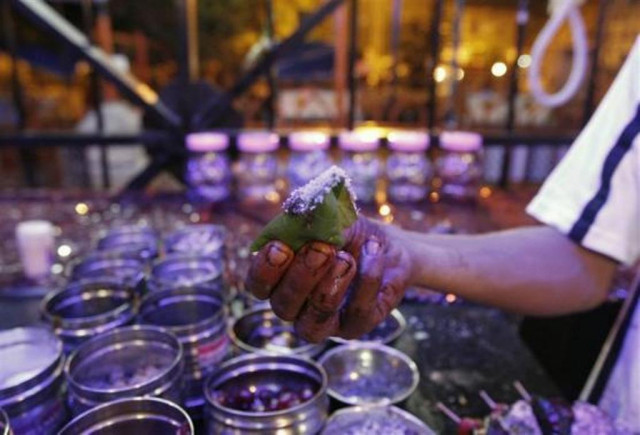Public health: 'Paan, supari, gukta leading causes of oral cancer'
Oral cancer, if diagnosed early, has high survival rate.

File photo of paan. PHOTO: REUTERS
Doctors at a seminar at King Edward Medical University (KEMU) on Friday said 40 percent of cancer patients in Pakistan had oral cancer. They said consumption of paan, supari and gukta were the leading causes of oral cancer in the country.
Speakers said in case of early diagnosis oral cancer had a very high survival rate but patients approached hospitals when the disease had reached its final stage. They said at this stage, the chances of survival were greatly diminished.
They said preservatives and chemicals in gutka and supari were the main causes of the spread of oral cancer.
“There is a need to raise awareness among people about this type of cancer,” said Health Director General Dr Zahid Pervaiz.
He said oral cancer had become the second most prevalent cancer disease in South Asia. He said oral cancer caused hundreds of thousands of deaths every year.

The seminar was organised by Maxillofacial Surgery Department of the KEMU.
Maxillofacial Surgery Department Head Professor Nabila said two main causes of oral cancer were excessive use of tobacco and alcohol.
She said a lot of people in Pakistan suffered from oral cancer due to excessive use of tobacco. She said many people thought gutka wasn’t harmful but it had been found that many patients had been using either tobacco in paan or gutka when they were diagnosed.
She said if a wound in the mouth did not heal in two weeks, the person should immediately consult a doctor.
Health Secretary Khawaja Imran Nazir said the government was working on a preventive programme against various diseases. Nazir said creating awareness against the diseases was the responsibility of the government and the civil society. He said the civil society, government and media should join hands against the diseases and launch an awareness campaign in this regard.
He said a public campaign against tobacco was in the works and would be launched soon.
Published in The Express Tribune, January 11th, 2014.



















COMMENTS
Comments are moderated and generally will be posted if they are on-topic and not abusive.
For more information, please see our Comments FAQ